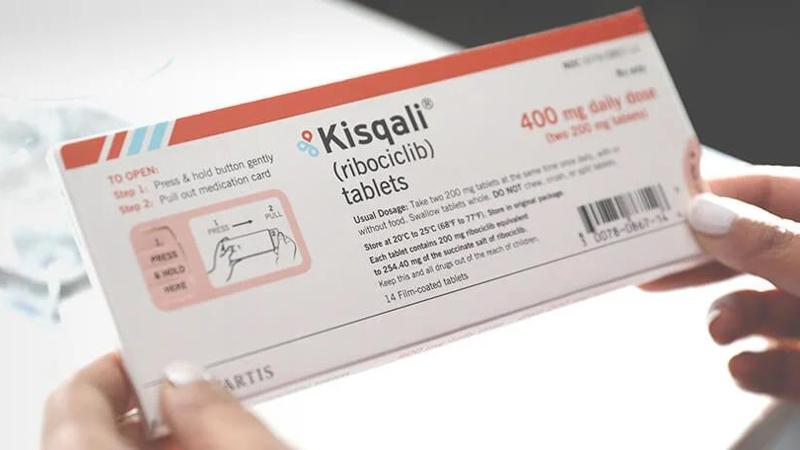ASCO: Novartis touts Kisqali adjuvant breast cancer data

Novartis looks odds on to extend the indications of its CDK4/6 inhibitor Kisqali into early-stage breast cancer, on the back of data from the phase 3 NATALEE trial reported at the ASCO congress.
Kisqali (ribociclib) given alongside endocrine therapy as adjuvant therapy for patients with stage 2 or 3 hormone receptor-positive, HER2-negative breast cancer reduced patients’ risk for recurrence by 25% compared to those on the endocrine therapy alone after 34 months’ follow-up.
Invasive disease-free survival rates (iDFS) remained high at the three-year data cut-off, coming in at 90.4% for Kisqali and 87.1% for endocrine therapy, but represented a significant improvement for Novartis’ drug, according to lead investigator Dennis Slamon of UCLA Jonsson Comprehensive Cancer Centre in Los Angeles.
At a prespecified interim analysis of 426 iDFS events, 189 people (7.4%) in the Kisqali arm had experienced a recurrence, compared to 237 people (9.2%) in the control group.
HR+, HER2- breast cancer is the most common subtype of the disease, making up nearly 70% of all breast cancer cases in the US and, according to Novartis, moving Kisqali into that space could unlock a potential $6 billion market for the drug.
Last year, Kisqali brought in $1.2 billion for Novartis from its already-approved uses as first- or second-line therapy for advanced and metastatic HR+, HER2- breast cancer, another setting that Novartis thinks is a multibillion dollar opportunity.
Standing in its path in the early-breast cancer category is Eli Lilly’s Verzenio (abemaciclib), which was approved by the FDA for adjuvant use in early breast cancer since 2021, initially in high-risk patients based on Ki-67 levels.
The drug made $2.5 billion in sales last year, and its label was extended in March to remove the need to test for the biomarker on the strength of the monarchE study, leading to predictions that peak sales could eventually approach $5 billion.
One potential advantage for Kisqali is that NATALEE included patients with both lymph node-positive and negative disease, whereas monarchE was confined to the node-positive population. Novartis has previously suggested that the study represents a population at least twice the size covered by Lilly’s.
It was notable that Novartis’ drug performed well across both populations – i.e. its benefit wasn’t being driven by the node-positive group – which could give it an advantage in the lower risk, node-negative population.
Some analysts think Novartis’ drug also has a better tolerability profile – helped by a lower-dose formulation used in the early breast cancer study – with Lilly’s drug possibly edging it in the efficacy stakes, given it achieved a 30% reduction in disease recurrence at 27 months in monarchE.
Slamon said that currently approved targeted treatments “can only be used in a small population of patients diagnosed with HR+, HER2- early breast cancer, leaving many without an effective treatment option for reducing risk of the cancer returning.”
“There is a significant unmet need for both reducing the risk of recurrence and providing a tolerable treatment option that keeps patients cancer-free without disrupting their daily life,” he continued, noting that NATALEE was specifically designed to address those needs.
Both Kisqali and Verzenio stand to benefit from the failure of CDK4/6 market leader – Pfizer’s $5.1 billion Ibrance (palbociclib) – to show activity in adjuvant early breast cancer in the PALLAS and PENELOPE trials.
Novartis has said it intends to file for approval of Kisqali in the new indication later this year.













